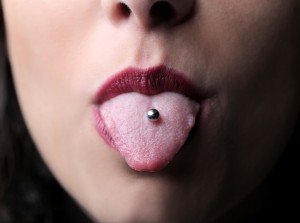 Piercings have long been a way for people to express themselves and enhance their personal style. Although many stick with the earlobes or venture out to the eyebrow or nose, oral piercings are also quite common. While many like the look of a lip or tongue ring, it’s important to understand that they can have a severe impact on your oral health if they’re not pierced or taken care of properly. Below, we’ve outlined some of the complications to look out for and the precautions you need to take before you go under the needle.
Piercings have long been a way for people to express themselves and enhance their personal style. Although many stick with the earlobes or venture out to the eyebrow or nose, oral piercings are also quite common. While many like the look of a lip or tongue ring, it’s important to understand that they can have a severe impact on your oral health if they’re not pierced or taken care of properly. Below, we’ve outlined some of the complications to look out for and the precautions you need to take before you go under the needle.
The Problems
The biggest problem by far is an infection. Even a perfectly healthy mouth contains tons of bacteria and since a piercing is, essentially, an open wound, it can be very difficult to prevent the piercing from becoming infected. In addition, oral piercings can transmit herpes simplex virus and hepatitis b or c, as well as blood-borne diseases such as endocarditis, the inflammation of the heart valves or heart tissue.
Tongue piercings are also particularly susceptible to excessive bleeding and nerve damaged. An inexperienced piercer can accidentally puncture one of the tongues many blood vessels, causing bleeding the can be difficult to stop. And, while the loss of sensation around the piercing can be a temporary side effect even after a properly-performed piercing, a novice can accidentally cause permanent nerve damage that can affect your ability to swallow and taste.
A fresh piercing anywhere on the body will often cause mild swelling to the surrounding area, though this can become dangerous with a tongue piercing. If the tongue swells too much it can become difficult to breathe, as well as talk and swallow.
The barbell jewelry (a long rod with a ball at either end) used in tongue piercings can cause additional problems. If the balls become loose, they can fall off and be swallowed or cause you to choke. They can also cause damage to the teeth by knocking against them, causing chips and breakage. Tongue piercings also make it more difficult to talk, and many will slur or lisp their words for at least a few days after the procedure.
Gum injuries are also commonly seen with both lip and tongue piercings. This is because the piercing — both barbell and hoops — rub against the gums when you talk, eat, and swallow, which can cause it to become infected and inflamed. In serious cases, the gums can begin to recede due to aggravation from the piercings, making the teeth and the sensitive roots more susceptible to infection, and even falling out.
Finally, as with any piercing, there is the danger of your jewelry getting accidentally snagged on something. This is particularly a problem with hoop-style lip rings though it can happen on tongue barbells as well. After your piercing has healed, be sure to remove your jewelry before exercising or playing sports, and be careful that it doesn’t snag on your clothing when getting dressed.
Care and Caution
With all that said, a properly done and cared for oral piercing can look great and cause few problems beyond the initial swelling and some lisped words in the first few days.
First and foremost, find a reputable piercer. Check online for reviews of piercers in your area, and try to find one who has been doing this for several years. Make sure that the studio is clean and that all of the instruments are sterilized before use. Jewelry and needles should all be in sterile packaging until just before the piercing is performed. If you have any reason to doubt that a piercer is operating in a contaminated environment or, frankly, that it seems like they don’t know what he or she is doing, look elsewhere!
A tongue piercing heals in about 4-6 weeks while cheek or lip piercings can take several months to fully heal. Try to never touch your jewelry with your hands — and if you absolutely need to, make sure you thoroughly wash your hands first. To clean your oral piercing, use an alcohol-free antibacterial mouth rinse or a mild sea salt rinse after meals, as well as in the morning and at night.
Although some pain, redness, and swelling are common right after getting pierced, it should subside within a few days. Continuous swelling and bleeding, as well as fever and dizziness, can be a sign of infection. See your doctor immediately for antibiotics, but remember not to take out the piercing. Although that may seem counterintuitive, removing a piercing during an infection can actually cause the infection to spread and worsen, which is definitely what you don’t want!
Finally, try not to bite on the piercing when you eat, and try to eat primarily soft foods in the first few days if you can. Spicy or sharp foods like peppers and chips can aggravate the piercing, which can also lead to swelling and infection.
Oral piercings can look great, but they come with more concerns than other piercings on your body. It’s important to be aware of all the risks before you go ahead and make the jump so you know what signs to look for in case something goes wrong. An infection that’s caught early can cause fewer problems than one that persists, and knowing how to treat and care for your piercing will help make the healing process go by more quickly and easily.







Leave a Reply